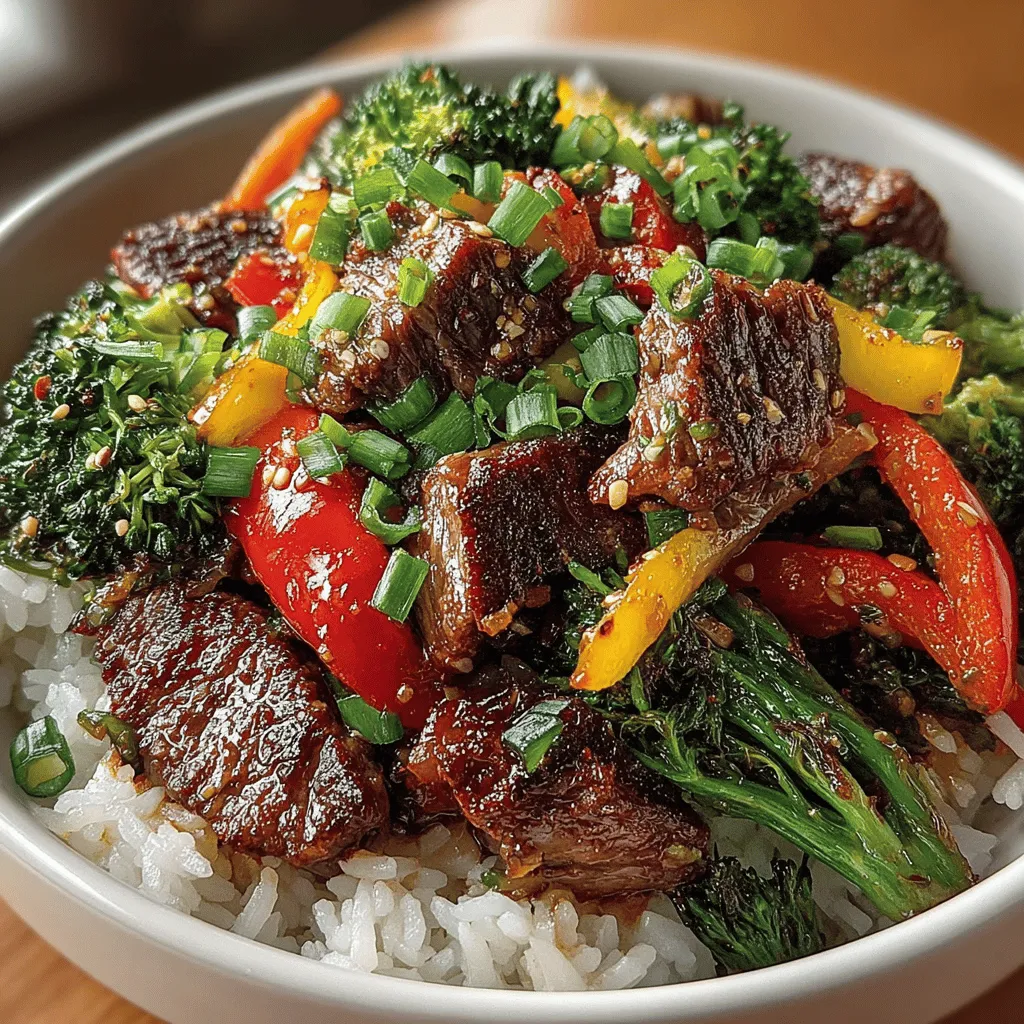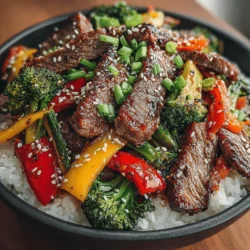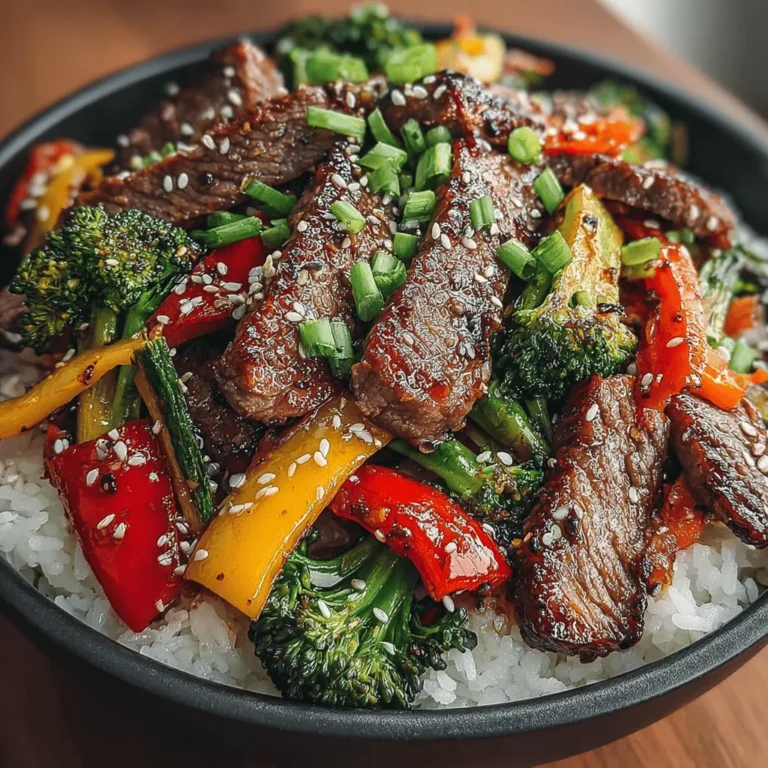Introduction to Savory Beef and Veggie Stir-Fry
In today’s fast-paced culinary landscape, the quest for a quick yet nutritious meal can often feel daunting. However, the Savory Beef and Veggie Stir-Fry emerges as a delightful solution that not only tantalizes your taste buds but also delivers a well-rounded meal brimming with protein and colorful vegetables. This dish exemplifies the beauty of stir-frying, enabling you to prepare a wholesome dinner in a matter of minutes without compromising on flavor or nutrition.
What makes this recipe even more appealing is its versatility; it can be easily adapted to accommodate various personal tastes and dietary preferences. Whether you prefer a medley of seasonal veggies or have a penchant for certain spices, this stir-fry can be tailored to meet your desires. With just a handful of ingredients and a straightforward cooking method, you can create a delicious meal that embodies the essence of home cooking—comforting, nourishing, and satisfying.
Understanding the Ingredients for Savory Beef and Veggie Stir-Fry
The Key Components of This Recipe
To create an unforgettable Savory Beef and Veggie Stir-Fry, it is essential to understand the significance of each ingredient used in the recipe. The primary star of this dish is undoubtedly the beef, which provides a robust flavor and essential protein. Choosing the right cut of beef is crucial; sirloin is often recommended for its ideal balance of tenderness and flavor. It cooks quickly and absorbs marinades exceptionally well, enhancing the overall taste of the dish.
Complementing the beef are a variety of vegetables that not only add color to the plate but also provide a wealth of nutrients. Common choices include bell peppers, broccoli, snap peas, and carrots, each contributing unique textures and flavors. The vibrant colors of these vegetables are not just visually appealing; they are also indicative of the range of vitamins and minerals they offer, making the dish more healthful.
Finally, the choice of sauces and seasonings elevates the stir-fry to a new level. Soy sauce and oyster sauce are staples in many stir-fry recipes, providing a rich umami flavor that enhances the beef and vegetables. Cornstarch is often included in the marinade to help tenderize the beef while also creating a glossy finish when cooked.
The Importance of Fresh Vegetables
Fresh vegetables play a pivotal role in the success of any stir-fry dish. Not only do they contribute to the dish’s flavor and aesthetic appeal, but they also bring essential vitamins and minerals that are vital for maintaining a balanced diet. For instance, broccoli is rich in vitamin C and fiber, while bell peppers offer a significant dose of antioxidants.
Using fresh produce ensures that the stir-fry retains its crunch and vibrant flavors, which can be lost when using frozen or canned alternatives. Moreover, the nutritional benefits of fresh vegetables can enhance your overall health, making this dish not just a meal but a nourishing experience.
Exploring the Beef Selection
When it comes to selecting beef for your stir-fry, sirloin stands out as an excellent choice. Known for its tenderness and rich flavor, sirloin cuts are perfect for quick cooking methods like stir-frying. The marbling in the meat helps retain moisture, ensuring that the beef remains juicy and flavorful.
For those with different dietary needs or preferences, alternatives such as flank steak or even lean cuts of chicken or tofu can be used. Flank steak, while slightly tougher, offers a bold flavor that can be enhanced through marination. On the other hand, chicken provides a leaner protein option, while tofu caters to vegetarian or vegan diets, allowing everyone to enjoy this savory dish without compromising their dietary choices.
Step-by-Step Guide to Making Savory Beef and Veggie Stir-Fry
Marinating the Beef for Optimal Flavor
The first step in crafting your Savory Beef and Veggie Stir-Fry is to marinate the beef. Marination is essential for flavor enhancement and texture improvement. Begin by slicing the beef sirloin against the grain into thin strips, ensuring that the pieces will cook evenly and remain tender.
In a bowl, combine soy sauce, oyster sauce, and cornstarch. The soy sauce serves as the base, infusing the beef with a salty umami flavor, while the oyster sauce adds depth and richness. Cornstarch is vital in this mixture as it helps to seal in moisture and creates a velvety texture as the beef cooks. Allow the beef to marinate for at least 15 to 30 minutes; this step not only enhances the flavor but also ensures a satisfying mouthfeel.
Preparation of Vegetables
While the beef marinates, it’s time to prepare your vegetables. Start by washing them thoroughly under cold water to remove any dirt or pesticides. After washing, dry them with a clean kitchen towel or paper towel to prevent excess moisture, which could lead to steaming instead of stir-frying.
Next, slice your chosen vegetables into uniform pieces. This is crucial for even cooking; smaller pieces cook faster and blend harmoniously with the beef. For instance, bell peppers can be sliced into strips, broccoli can be cut into florets, and carrots can be julienned. Take care to keep the sizes consistent, as this will ensure that everything cooks evenly and maintains a pleasing texture.
Heating the Pan: The Right Technique
The success of your stir-fry largely depends on how well you heat your pan. A hot pan is essential for achieving that perfect sizzle and sear, which is the hallmark of a great stir-fry. Use a wok or a large skillet for this dish, as their high sides make it easier to toss the ingredients without spilling.
Before adding any oil, preheat the pan over high heat until it starts to smoke slightly. Once the pan is adequately heated, add a high smoke point oil such as vegetable oil or peanut oil. These oils can withstand the high temperatures needed for stir-frying without burning, allowing you to achieve a crispy exterior on your beef and vegetables.
Stir-Frying the Beef: Techniques for Success
With your pan heated and your ingredients prepared, it’s time to begin the stir-frying process. Carefully add the marinated beef to the hot pan in a single layer, allowing it to sear without overcrowding the pan. This technique is crucial; overcrowding can lower the pan’s temperature and result in steaming rather than stir-frying.
Let the beef cook for a minute or two, undisturbed, to allow a nice crust to form. Once it’s browned on one side, stir it gently to ensure even cooking. As the beef cooks through, it will release its juices, which will mingle with the sauces, creating a delicious base for your stir-fry.
After the beef is nearly cooked, it’s time to add the vegetables. Follow the general rule of cooking the vegetables that take the longest first, such as carrots and broccoli, before adding quicker-cooking ones like bell peppers and snap peas. Stir-fry the mixture until the vegetables are crisp-tender and the beef is cooked to your liking, ensuring that everything remains vibrant and flavorful.
This method of preparation not only results in a delicious meal but also emphasizes the importance of technique in achieving a perfect stir-fry. With each step carefully executed, you’ll create a dish that is not only satisfying but also a true celebration of flavor and nutrition.

Best Practices for Stir-Frying Beef
Stir-frying is a quick cooking method that requires precision and timing, especially when it comes to beef. To achieve perfectly cooked beef that is tender and flavorful, consider the following best practices:
Cooking Times
When stir-frying beef, the goal is to achieve a nice sear while keeping the meat tender. Thinly sliced beef (about 1/4 inch thick) cooks quickly, usually within 2 to 4 minutes. Ensure that you slice against the grain for maximum tenderness. For optimal results, cook the beef in small batches. This not only allows the meat to brown evenly but also helps maintain its moisture.
Avoiding Overcrowding the Pan
One of the biggest mistakes when stir-frying is overcrowding the pan. When too much beef is added at once, the temperature of the pan drops, leading to steaming rather than sautéing. This can result in chewy, rubbery meat. To avoid this, cook the beef in batches, ensuring there is enough space for each piece to make contact with the pan. Use a large, heavy-bottomed wok or skillet to facilitate even heat distribution.
Ensuring Even Browning
For even browning, allow the beef to sear undisturbed for the first minute or so before stirring. This will create a lovely crust that enhances the flavor of the dish. Once the beef is browned, remove it from the pan and set it aside while you prepare the vegetables. This will also help keep the beef juicy, as it won’t be overcooked during the vegetable cooking process.
Cooking the Vegetables: Achieving Tender-Crisp
The vegetables in your stir-fry should complement the beef, both in flavor and texture. To achieve that perfect tender-crisp texture, follow these tips:
Timing and Techniques
Different vegetables have varying cooking times. Start with the hardest vegetables first, such as carrots and bell peppers, as they take longer to cook. After a minute or two, add softer vegetables like broccoli and snap peas. The key is to cook them just until they are tender but still vibrant in color and crisp in texture. This typically takes about 3 to 5 minutes, depending on the heat and type of vegetable.
Maintaining Color and Nutritional Value
To preserve the color and nutrients of your vegetables, consider blanching them briefly before adding to the stir-fry. This technique involves boiling them for a minute and then plunging them into ice water to stop the cooking process. This helps retain their bright color and crunchiness. However, if you prefer a simpler approach, just make sure not to overcook them in the pan. The high heat of stir-frying should quickly cook the vegetables while keeping them bright and healthy.
Combining Ingredients for Flavor Harmony
Once the vegetables are tender-crisp and the beef is cooked, it’s time to combine the two for a harmonious dish.
Properly Combining Beef and Vegetables
Add the cooked beef back into the pan with the vegetables, mixing them gently to combine. This ensures that the flavors meld together beautifully. If you’ve made a sauce (as suggested in the earlier part of the recipe), now is the time to add it. The sauce should coat the beef and vegetables evenly, enhancing the overall flavor profile.
The Role of Sesame Oil
Sesame oil plays a crucial role in stir-frying, not just as a cooking fat but also as a flavor enhancer. Drizzling a small amount of toasted sesame oil at the end of the cooking process adds a nutty aroma and depth of flavor that elevates the dish. Be cautious not to use too much, as its strong flavor can overpower the other ingredients. A teaspoon or two is usually sufficient to impart that delightful sesame essence.
Serving Suggestions for Your Stir-Fry
Pairing with Rice or Noodles
The right base is essential for a successful stir-fry. Steamed jasmine rice or brown rice are classic options that provide a neutral backdrop for the robust flavors of the stir-fry. Jasmine rice, with its slightly floral aroma, adds an elegant touch, while brown rice offers a nuttier flavor and added fiber.
Alternatively, consider serving your stir-fry over noodles. Rice noodles or egg noodles work wonderfully, soaking up the sauce and providing a satisfying chew. For a low-carb option, zucchini noodles or cauliflower rice can also be an excellent choice, allowing you to enjoy the stir-fry without the extra carbohydrates.
Garnishing for Presentation and Taste
Garnishing not only enhances the visual appeal of your dish but also adds layers of flavor. Sliced green onions are a popular choice for garnish, providing a fresh, oniony crunch. Additionally, toasted sesame seeds can add a delightful crunch and a nutty flavor. For a touch of heat, sprinkle some red pepper flakes or drizzle sriracha over the top. Fresh cilantro or parsley can also be used for a pop of color and freshness, making your stir-fry look as good as it tastes.
Nutritional Benefits of Savory Beef and Veggie Stir-Fry
A Balanced Meal in a Bowl
This Savory Beef and Veggie Stir-Fry is not only delicious but also packed with nutritional benefits. Beef is an excellent source of protein, which is essential for muscle repair and overall health. Additionally, it provides important nutrients like iron, zinc, and B vitamins. The colorful array of vegetables—such as broccoli, bell peppers, and snap peas—contributes essential vitamins and minerals, including vitamin C, vitamin A, and dietary fiber.
Together, these ingredients create a balanced meal that not only satisfies hunger but also nourishes the body. The combination of protein, vitamins, and minerals makes this stir-fry a wholesome choice for any dinner table.
Customizing for Dietary Preferences
One of the best aspects of stir-frying is its versatility. If you’re looking to accommodate specific dietary preferences, there are plenty of ways to modify this recipe. For a vegetarian option, substitute the beef with tofu or tempeh, which can absorb the flavors of the stir-fry beautifully. You can also use a variety of plant-based proteins such as chickpeas or lentils.
For those requiring gluten-free options, ensure that you use gluten-free soy sauce or tamari instead of regular soy sauce. Serve the dish over rice rather than noodles if you prefer a gluten-free grain. These options allow everyone to enjoy the savory flavors of your stir-fry without compromising dietary needs.
Conclusion: Enjoying Your Savory Beef and Veggie Stir-Fry
In conclusion, the Savory Beef and Veggie Stir-Fry is not just a meal; it’s an experience that brings together vibrant flavors and wholesome ingredients. This dish exemplifies a quick yet satisfying way to enjoy a home-cooked meal, making it a go-to recipe for busy weeknights. With its ease of preparation and customizable nature, it serves as a canvas for culinary creativity. Whether you stick to the original recipe or adapt it to your liking, this stir-fry is sure to become a beloved staple in your kitchen.
Encouraging experimentation with different vegetables, proteins, or sauces can make this dish your own. So gather your ingredients, follow the steps, and savor the delightful combination of flavors in your very own savory beef and veggie stir-fry. Enjoy your cooking journey!

